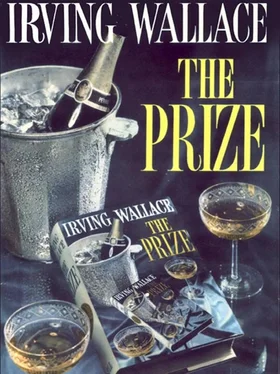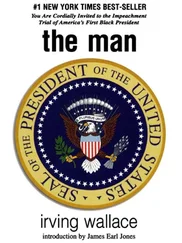‘And Daranyi knows,’ Lilly went on gaily to Craig, ‘that the Swedish girl has a trial, with more women than men in Sweden-’
‘Six women to every five men in Stockholm,’ said Daranyi precisely.
‘-and a girl so old as twenty-three, like myself, will be an old maid, and mean and nervous, if she does not have a man she admires in her bed at least every fortnight. So do not be embarrassed, Mr. Craig. I am sure Daranyi will tell you that when he came this morning, he was pleased to find you in my bed.’
‘It is true,’ said Daranyi with equanimity.
‘Now, into the living-room, gentlemen,’ said Lilly. ‘We will have breakfast.’
Somewhat bewildered, but enjoying himself, Craig followed Daranyi into the living-room. Daranyi cleared the glass coffee table and drew up the two wicker chairs, and Lilly served fruit juice, ladled out the scrambled eggs from an earthenware dish, and put cups of coffee before them. Then they all sat and ate.
‘Lilly tells me you are a writer,’ said Daranyi to Craig.
Craig, his mouth full, nodded.
‘Fiction or non-fiction?’ inquired Daranyi.
‘Fiction,’ said Craig.
‘Then it is unlikely I have read you. In my work, one has little time for novels. I must spend my book time with politics and biography, current and past, and most of my time for reading I give to newspapers and periodicals.’
‘What is your work, Mr. Daranyi?’ asked Craig.
Daranyi had brought the fruit juice to his lips, but now he held it poised. ‘I am a spy, Mr. Craig,’ he said, and then, he slowly drank down the juice.
Craig knew that his face was foolish with astonishment. He had made his inquiry casually in passing, not expecting anything of interest, expecting perhaps that Daranyi might be an insurance salesman or shoe clerk or civil servant. Instead, he had named the most improbable profession on earth. Craig decided that his ears had deceived him. ‘Did you say-spy?’
‘That is correct,’ said Daranyi, wolfing down his eggs. As he chewed them, he went on. ‘It is not the happiest profession any longer. Once, it was. But no more. If I had a son, I would not let him follow in my footsteps. I would rather let him be a dentist.’
Craig remained nonplussed. Was the potbellied man having sport with him? He appeared serious enough, and Lilly, committed to her breakfast, was hardly listening and certainly no part of a joke. ‘But if you’re a spy,’ said Craig, ‘whom do you work for? And how can you even mention it?’
‘Among friends I can mention it,’ said Daranyi. ‘If I do not mention it, how will I find clients? Besides, most people do not take me seriously. It is an unlikely profession, is it not? Most people think I am having fun with them. There is no need for secrecy, except when I am actually at work. When I am at work, I am undercover and discreet. As to whom I will work for, the answer is-anyone who will pay well. I am the last of a breed almost extinct-the free-lance spy.’
‘Exactly what does that mean?’
‘It means, Mr. Craig, that ideological amateurs have almost put the professional spy out of business. The operation of the Soviet Union is typical. Their intelligence need not shop for expensive agents abroad. They know there are enough idealistic Communist fanatics or fellow travellers who will do the job with dedication at cut-rate fees. The Dr. Allan Nunn Mays, and Dr. Fuchses, and Rosenbergs have made my lot a hard one. There were always national agents, of course, but there were free-lance spies, also. For example, Gertrud Zelle-you know her as Mata Hari or H. 21. Hundreds of men and women like her, who had no allegiance but to themselves and the nobility of their profession, worked for any nation, at any task, on a flat-fee basis. As a young man, in Budapest, I aspired to this profession, as one does to law or medicine. From my reading, it appeared that while there were risks, the inducements were worth while-constant travel, interesting people, excellent food, considerable income, and possible immortality in histories. In the Second World War, I worked for the Germans in Istanbul. I had cultivated some peculiar talents-one of them lip reading-and I would sit in the cafés and restaurants and read the moving lips, across the room, of American and French and English diplomats and pass on their conversations. After the war, I did some valuable work for the English in Jordan and Palestine. You see, I play no favourites. Emotionalism is synonymous with starvation for one like me. The German mark and the English pound buy the same food and clothing.’
‘How did you come to Sweden?’ Craig wanted to know.
‘I could not go back to Budapest, nor did I wish to,’ said Daranyi. ‘I was stateless. I had no genuine passport, although I had several faked ones that I had used. I cold-bloodedly selected Sweden as a perfect base of operations. It is near Moscow, near the two worlds of Berlin, and yet with powerful American and English influences. And Sweden itself, in its anxiety to remain neutral is an excellent espionage customer. It was not difficult to obtain an assignment here as a minor foreign correspondent. Once here, I made myself useful to several persons in high places, and they have seen that I am permitted to remain. Stockholm has its faults. It goes to sleep too early. It is not Paris or Rome or Vienna or Istanbul. But there are worse places. My income is limited, but my needs are modest. I have a pleasant routine. I have good friends like Lilly.’
‘Tell Mr. Craig about Enbom,’ said Lilly from her coffee.
‘Enbom, yes,’ said Daranyi. ‘Lilly is proud of my part. So am I. You see, Mr. Craig, I make no pretences with you. I am no great one like Alfred Redl or Jules Silber or Fräulein Doktor Elsbeth Schragmüller. First, I came too late to my profession. My kind of espionage is now outmoded, as I have said. Second, I am a coward. I am not ashamed to confess it. I am a spy who is scared. With such limitations, I do not receive many important assignments. In some ways, I have been reduced to a researcher. My last assignment, a month ago, was for a Danish industrialist, who desired certain private knowledge of a new Swedish competitor. Before that, I made an investigation for a member of the Royal Swedish Academy of Science-’
Craig was surprised. ‘A Nobel judge?’
‘As a matter of fact, yes,’ said Daranyi. ‘Dr. Carl Adolf Krantz, an old client of mine. You have probably never heard of him. At any rate, I had better not speak of that.’
Craig said nothing, although he was curious. He found his pipe and filled it, and remained attentive.
‘But occasionally, rarely, but sometimes, an important case comes to me. Such was the one Lilly refers to-the Enbom case, in 1952. You have heard of it?’
‘I’m sure I read about it,’ said Craig, trying to remember.
‘It was the most important spy trial in our history,’ said Lilly. ‘And Daranyi played a role.’
‘Fritiof Enbom was a reporter for a Swedish Communist newspaper in Boden,’ Daranyi said to Craig. ‘That is our vital fortress in Lapp country, near Finland. He was a Swede, and one of those ideological spies I was telling you about. He was an agent for Soviet Russia. He started during the Second World War for Russia. He had secreted a radio transmitter. He came often to Stockholm. When he did, bringing with him reports of our fortifications, he would leave a twisted hairpin in the crevice of a house near the Russian Embassy, and then the Russians would call on him. All went well, until 1951. Then he had a falling out with the Communists, quit his newspaper in Boden, and moved down here to Stockholm. Since Enbom needed a job, he asked help of some of his old Swedish Communist comrades in the government. They refused him. Enbom was extremely put out. One night, complaining to a friend, he told what he had done for the Communists as a spy. The friend, a loyal Swede, went to the Ministry of Defence. Enbom was promptly arrested. So were his brother and mistress-here is where I came into the story, but I cannot yet reveal what I was hired to do or who hired me-and also arrested were four others. Enbom was charged with selling military secrets to Russia for ten thousand kronor. The others were charged the same. Enbom was convicted and given Sweden’s harshest penalty-life in prison at hard labour. Of the others, one was acquitted, and five also sent to prison, although for lighter sentences. But, you see, sometimes my life is not so drab. Perhaps some day you will want to write my story, Mr. Craig?’
Читать дальше












